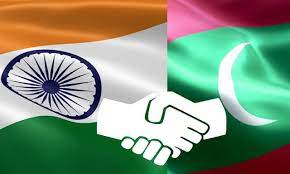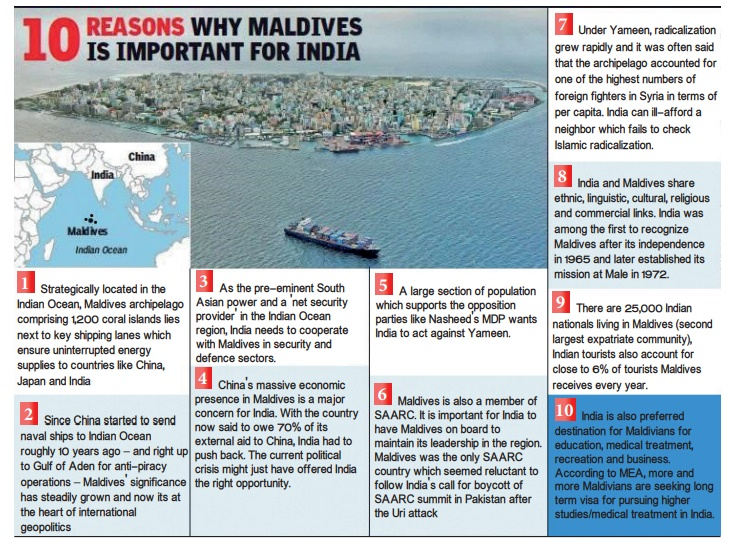
India-Maldives ties & Challenges
India-Maldives ties & Challenges
GS-2: International Relations
(UPSC/ State PSCs)
Why in news:
Recently, the Maldives Cabinet decided against renewing a Memorandum of Understanding (MoU) with India for cooperation in hydrography.
- The agreement, which was signed in 2019, is due to expire in 2024.
- Coming soon after newly elected President Mohamed Muizzu’s pledge to send back Indian troops currently stationed in the Indian Ocean archipelago, the move is yet another indication of his government’s intention to reverse the former Ibrahim Mohamed Solih administration’s ‘India first’ policy.
What is hydrography:
- It is the science of studying oceans, seas, and other water bodies, by compiling and analysing data, maps, and charts.
- Branching off from applied sciences, it looks at measuring and describing the physical attributes of water bodies and predicting how they might change over time.
Significance of hydrography:
- It is primarily for safety of navigation.
- It also supports other activities, such as economic development, security and defence, scientific research, and environmental protection.
- Hydrographical measurements include tidal, current and wave information.

What is India's expertise:
- India has been an active member of the International Hydrographic Organization (IHO) since 1955.
- It was established to support the safety of navigation and protection of the marine environment.
- The Indian Naval Hydrographic Department (INHD) was established in 1874 in Kolkata. It is the nodal agency for hydrographic surveys and has a fleet of indigenously built modern survey ships.
- India partners with many countries in the Indian Ocean Region(IOR) and African and East Asian countries such as Mauritius, Seychelles, Tanzania, Maldives, Mozambique, Vietnam, Myanmar, Kenya, and Sri Lanka.
About IHO:
- The International Hydrographic Organization is an intergovernmental consultative and technical organization established in the year 1921.
INHD's strategic role
- According to the INHD, its role has broadened over time, owing to the heightening global character of hydrography and "its growing potential as a force multiplier" in terms of maritime diplomacy. Personnel from 39 countries have trained at the National Institute of Hydrography, functioning under the INHD.
Significance of MOU (2019) for India
- The MoU was signed in June 2019, during Prime Minister Narendra Modi's state visit to the Maldives. It was Mr. Modi's second visit to the Maldives since he participated at President Solih's swearing-in ceremony in 2018.
- The two Indian Ocean neighbours, and their leaders, backed by a decisive majority, committed to close cooperation in development, defence and maritime security.
- The first meeting of the Joint Commission on Hydrography was held in the Maldives in September 2019.
- Following the agreement, the Maldives National Defence Force (MNDF) and the Indian Navy have carried out three joint hydrographic surveys in 2021, 2022, and 2023.
Cause of not renewing MoU(2019):
- According to a senior official, the decision was aligned to the current administration's pledge to terminate all agreements with foreign parties that are detrimental to or endanger the national security of the Maldives.
- It is in the best interest of Maldivian sovereignty that this capacity is improved within our own military, entrusting them with the responsibilities of surveilling and policing our waters, and excluding the participation of any foreign party in such an endeavour.
Impact of this incidence on India-Maldives ties:
- Relations between India and Maldives will be challenging.
- As India has a proven track record in the field of hydrography and india have also been cooperating with many countries in the Indian Ocean region on hydrography and various elements related to that.
- If Maldives leaves the Joint Hydrographic Initiative, it could have a negative impact on maritime security in the Indian Ocean.
- Earlier this month, the Maldives skipped the latest round of the Conclave's NSA-level meet held in Mauritius.
- In the recent scenario, Maldives has shown keenness to explore new avenues of development by cooperating with China through the China-Indian Ocean Region Forum, which has increased India's concern.
About Colombo Security Conclave:
- Maldives is a member of the Colombo Security Conclave, an initiative aimed at enhancing Indian Ocean maritime security, that includes India, Sri Lanka, and Mauritius.
Current Challenges between India and Maldives:
India Out Campaign:
- The campaign accused India of violating the sovereignty of the Maldives by allowing Indian military presence on the islands.
- The government issued a presidential order banning "campaigns inciting hatred against different countries under various slogans" as well as specifically mentioning the India-Out protests.
Increasing Chinese Presence:
- China's ambitions in the Indian Ocean region have expanded and the Maldives welcomed the visit of President Xi Jinping in 2014. The two signed a free trade agreement and negotiated the establishment of a joint ocean observing station.
- China offered mega-infrastructure projects and loans to the Maldives, most of which were under opaque terms and conditions.
Criminality, Fundamentalism and Extremism:
- Four groups of factors influence such behavior which include structural factors such as poverty and poor governance, convenience factors such as news channels and social network platforms, individual factors such as socio-economic status and trigger factors.
- The presence of high unemployment and poverty along with the politicization of the news media is increasing the susceptibility of Maldivian citizens to extremism, driving many towards terrorist groups such as ISIS and Al-Qaeda.
Political uncertainty:
- Muizzu focused on the Indian Army stationed on an island and described it as a threat to the sovereignty of the Maldives. With Muizzu coming to power, India will have to navigate a difficult diplomatic balancing act with the Maldivian government.
Climate change:
- As low-lying island nations, both India and the Maldives are vulnerable to the impacts of climate change, including rising sea levels and marine heat waves.
Way Forward:
- India must completion of its current projects(like- the Greater Male Connectivity Project-GMCP) to maintain its footprint in Maldives.
- Maldives has a high rate of youth unemployment.
- India’s HICPs in Maldives must include projects that aim to improve employability and foster entrepreneurship among the youth.
- Tackling China’s Influence, India must offer credible and lucrative alternatives to Chinese projects in Maldives.
- To deal with terrorism and other issues, India should restore strong defense ties with Maldives.
- Constructively engaging with the ruling government and adept navigation of internal politics while balancing competing interests will require the ability to align foreign policy goals with domestic priorities.
Conclusion:
- India-Maldives relations have a long and friendly history, but internal current challenges such as the "India Out" campaign, China's greater involvement, political uncertainty and climate change have strained relations between the two countries. India should focus on building a stronger and more flexible partnership to address regional and global issues related to Maldives.
Source: THE HINDU
-------------------------------------------
Mains Question
Recently, Maldives decided not to renew a Memorandum of Understanding (MoU) with India for cooperation in hydrography. Discuss its impact and challenges on both countries.